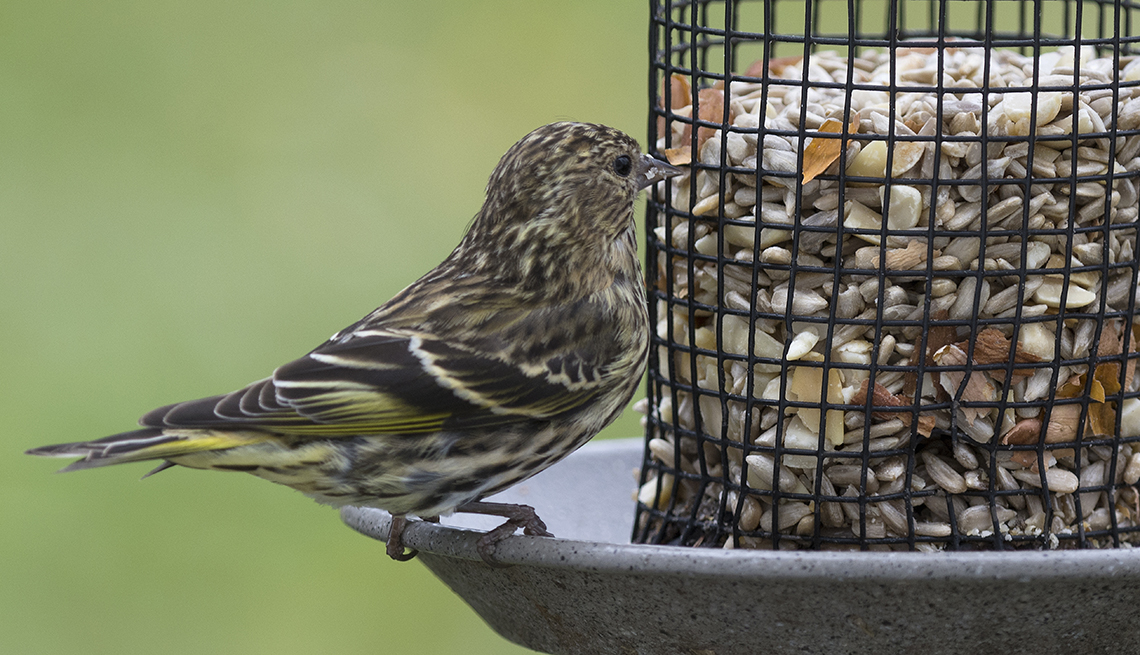Why Your Backyard Bird Feeder Might Make You Sick - AARP
En español | While hearing birds chirp in your backyard may be a welcome sign of spring, the Centers for Disease Control and Prevention (CDC) issued a warning April 1 about an outbreak of salmonella linked to wild songbirds across the country.
Although birds may appear clean and healthy, there have been reports of pine siskins, a type of finch, infected with the same strain of salmonella found in infected humans.
How to Clean Your Bird Feeder
Clean and disinfect your bird feeder and birdbath weekly or when they are visibly dirty. Clean them outdoors when possible. If you clean them indoors, use a laundry sink or bathtub and disinfect that area right after. Don't clean bird feeders in your kitchen or where food is prepared and stored.
- Scrub the feeder with warm, soapy water to remove the dirt.
- Rinse away soap.
- Soak it in a solution of 9 parts water to 1 part bleach for at least 10 minutes.
- Let it dry before refilling with water or bird food.
- Wash your hands with soap and water.
Source: CDC
The CDC has recorded 19 illnesses across eight states resulting in eight hospitalizations. Infections have occurred in California, Kentucky, Mississippi, New Hampshire, Oklahoma, Oregon, Tennessee and Washington. But, because the birds can be found throughout the U.S., the outbreak may not be limited to the states with known illnesses.
Sick people range in age from 2 months to 89 years old, with a median age of 16 years. Their illnesses occurred on dates ranging from Dec. 26 to March 16. More recent illnesses may not be reported yet because it usually takes two to four weeks to determine if a person's infection is linked to an outbreak. The true number of sick people is likely higher than the recorded number because many people recover without medical care and are not tested for salmonella, according to the CDC.
The birds first become infected when they ingest food or water or come into contact with objects contaminated with feces from other infected animals. Humans who don't wash their hands after touching the infected animals or contaminated bird feeders, birdbaths or pets that have been in contact with the birds are at risk of illness.
Health officials are interviewing people about the animals they had contact with the week before falling ill. Of the 13 interviewed so far, nine reported owning a bird feeder, two reported contact with a sick or dead wild bird, and 10 have pets that had access to or contact with wild birds.
How to keep people and animals healthy
The CDC suggests that people clean and disinfect bird feeders and baths weekly or when they are visibly dirty. Make sure to keep pets away from feeders and baths and the areas under them. If you find a sick or dead bird in your yard, remove your feeder and bath for two weeks and clean it outdoors.
Remember to wash your hands with soap and water:
- After touching bird feeders or baths.
- After handling a bird, even if you wore gloves.
- After touching your pet or its supplies.
- After picking up your pet's feces, even if you used a bag.
- Before you eat or drink.
Although sick birds may appear healthy, they usually look weak, have labored breathing, and may sit for prolonged periods with fluffed or ruffled feathers. If you find a sick bird, call your state wildlife agency or rehabilitator. If it is dead, check to see if the wildlife agency has information about reporting it in your area; the bird may be tested for disease.
Songbirds are the only animals known to be spreading infections to humans recently. Over the past year, the CDC has investigated salmonella outbreaks linked to small turtles, pet bearded dragons, pet hedgehogs and backyard poultry.

AARP Membership — $12 for your first year when you sign up for Automatic Renewal
Join today and get instant access to discounts, programs, services, and the information you need to benefit every area of your life.
Symptoms of a salmonella infection
Those who contract salmonellosis, the intestinal infection caused by the bacteria, typically experience diarrhea, fever and stomach cramps. In severe cases, the infection can spread from the intestines to urine, blood, bones, joints, spinal fluid or the brain. Symptoms usually begin six hours to six days after infection and last up to seven days. But in some instances, symptoms appear weeks after infection or symptoms persist for weeks, according to the CDC.
Infections are diagnosed with a lab test that will determine if the bacteria are present in a person's stool, body tissue or fluids. Although most people can recover without antibiotics, an antibiotic is recommended for anyone with a severe illness. Antibiotics also are recommended for infected adults over age 65 (or over 50 if an underlying condition such as heart disease is present), infants and those with weakened immune systems.
Aaron Kassraie writes about issues important to military veterans and their families for AARP. He also serves as a general assignment reporter. Kassraie previously covered U.S. foreign policy as a correspondent for the Kuwait News Agency's Washington bureau and worked in news gathering for USA Today and Al Jazeera English.
Also of Interest
- The pandemic has made birding cool
- Turn your backyard into a certified wildlife habitat
- 7 foods that can cause food poisoning

Comments
Post a Comment